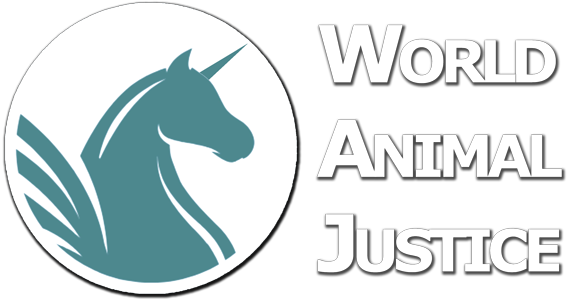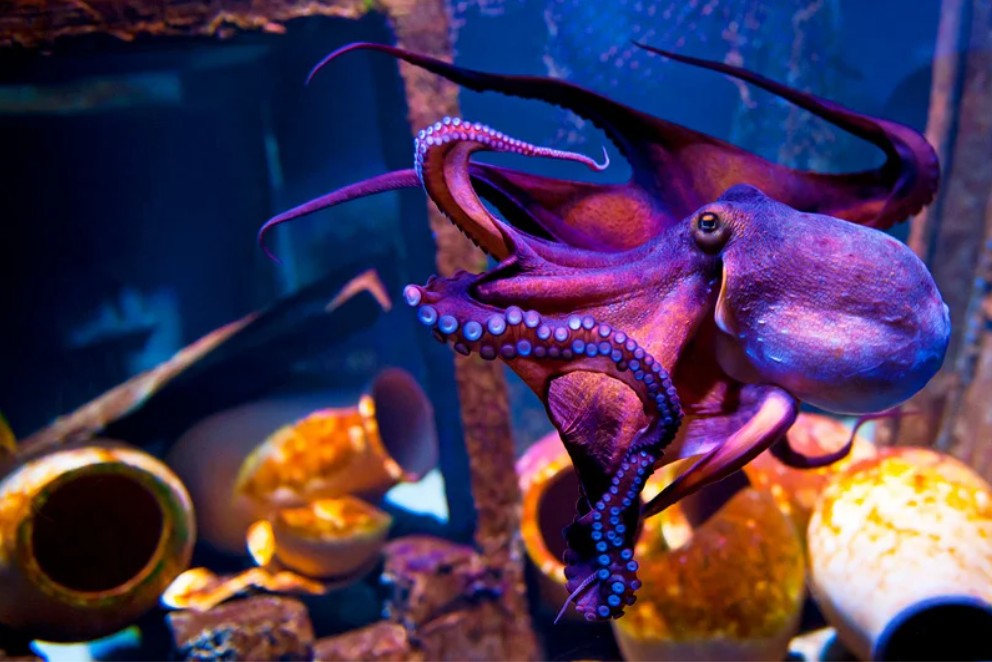Justice for Aquatic Invertebrates: Ending Cruel Practices Through Urgent Legal Reforms
The lack of legal protection for aquatic invertebrates highlights a critical gap in animal welfare legislation, leaving species such as octopuses, lobsters, crabs, and shrimps vulnerable to cruel and unethical practices. As scientific research continues to reveal their capacity for suffering, complex behaviors, and cognitive abilities, it is imperative that legal frameworks evolve to acknowledge their sentience [1].
Aquatic invertebrates, which include cephalopods (e.g., octopuses, squids), decapods (e.g., lobsters, crabs), and crustaceans (e.g., shrimps), are central to the global seafood industry. Although there is substantial evidence of their ability to experience suffering, these animals are often excluded from welfare regulations. This brief paper outlines examples of existing legal protections for aquatic invertebrates and advocates for banning cruel practices in food production, experiments, and captivity, while emphasizing their inclusion in animal welfare laws.
The Forgotten Creatures of Animal Welfare Laws
Aquatic invertebrates are frequently overlooked in animal welfare legislation. Despite mounting scientific evidence confirms that these species experience pain and distress, legal protections afforded to them remain inconsistent, with most frameworks excluding aquatic invertebrates from animal welfare laws.
This research provides the preliminary findings of a comparative analysis of the legal protections—or lack thereof—afforded to aquatic invertebrates across various jurisdictions. This study aims to identify which countries have enacted legislation to safeguard these often-overlooked species, particularly concerning welfare standards and farming bans.
Legislative Protections in the European Union (EU)
Within the European Union (EU), protections are somewhat fragmented.
The key instrument is EU Regulation No 1379/2013, which establishes the common organisation of the markets in fishery and aquaculture products. This regulation governs how seafood (whether wild‐caught or aquaculture‐produced) is marketed, labelled, and traded within the EU. It sets out the rules and standards to ensure that seafood products are produced, handled, and presented in a manner that meets EU food safety, quality, and sustainability requirements. It is important to note that fish and seafood are measured and reported by weight (usually in kilograms or tons) rather than by the number of individuals, reflecting how aquaculture resources are typically assessed.
Council Directive 98/58/EC broadly applies to farmed animals but lacks species-specific provisions for aquatic invertebrates [2]. In general, aquatic invertebrates are excluded from welfare legislation, except in research settings. Despite this classification, they are sentient beings who should be considered as such and covered by the farming directive. The EU also enforces regulations to ensure the humane transport of live fish, but these regulations do not concern aquatic invertebrates. Additionally, EU rules mandate humane slaughter practices for vertebrates but exclude hunting and recreational fishing.
The EU Directive 2010 on animal experiments covers “all live cephalopods” [3]. Other groups, such as crustaceans and mollusks (excluding cephalopods), are not protected under the Directive, though future legal amendments might extend coverage based on ongoing scientific research.
Certain EU member states—including Ireland [4], Finland [5], and Malta [6]—offer broader protection under laws referring to “animals” or “all animals.” However, the interpretation of these terms is ambiguous and could either include or exclude aquatic invertebrates. Greece [7] and Estonia [8] take a more explicit approach by incorporating “invertebrates,” “cephalopods” and “decapod crustaceans” into their welfare legislation. Germany’s Animal Welfare Act [9] does not explicitly ban boiling lobsters alive, but its focus on humane treatment has led some local authorities and courts to impose restrictions, though no national ban exists.
The Austrian Animal Welfare Act 2004 includes provisions against inhumane killing methods, which have been interpreted to prohibit boiling lobsters alive [10]. Some Italian regions, such as Lombardy, have adopted local regulations that prohibit the practice, aligning with national and European animal welfare standards.
Legal Protections Beyond the EU in Europe
Some non-EU nations have taken significant strides in recognizing the rights of aquatic invertebrates.
A significant breakthrough came from countries close to the EU.
The UK, which left the EU in 2020, legally recognizes certain invertebrates as sentient beings. The Animal Welfare (Sentience) Act 2022 acknowledges decapod crustaceans and cephalopods as sentient beings [11], mandating their protection against unnecessary suffering at the time of slaughter, but this protection does not extend to all aquatic invertebrates.
In Norway, an EEA member, the Animal Welfare Act extends protections to certain aquatic invertebrates [12]. Specifically, the Act applies to decapod crustaceans (such as crabs, lobsters, and shrimp) and cephalopods (including squid and octopuses). The Act emphasizes promoting good animal welfare and respect for animals but it does not cover all aquatic invertebrates and its implementation on this matter is unclear.
In Switzerland, an EFTA member, the law includes crustaceans, but it does not provide broad protection for all aquatic invertebrates, knowing that in 2018, Switzerland set a precedent by mandating that lobsters and other crustaceans must be stunned before slaughter [13].
Legal Protections Beyond Europe
A few other examples of legal protections can be found in Asia, Oceania and the US.
In East Asia, Hong Kong [14] takes this a step further by explicitly mentioning “fish” and “invertebrates” in its cruelty prevention laws. The law in Hong Kong provides basic welfare protections for fish and invertebrates but does not interfere with the legality of production or consumption.
In New Zealand, under the Animal Welfare Regulations 2018, it is illegal to boil spiny lobsters alive without prior stunning. However, this regulation does not extend to all crustaceans [15].
A significant step forward was taken with the recent ban on octopus farming in the U.S. state of Washington [16], a landmark decision that did set a precedent for broader protections in the country. California has banned both the farming and sale of farmed octopuses through legislation [17]. Other states including Oregon, New Jersey, and Connecticut have introduced legislation to prohibit octopus farming. However as of January 2025, these bills have not yet been enacted into law.
Despite growing awareness of the ethical, ecological, and sustainability concerns surrounding octopus farming, there remains a significant risk of its expansion, particularly through funding from sustainability initiatives that paradoxically support an industry that contradicts true environmental and ethical principles. Intensive octopus farming raises serious animal welfare concerns, as the extreme confinement contradicts their natural behavioral needs and involves cruel slaughter methods, including live decerebration. Therefore, advancing legislative bans, and even adopting preemptive measures, is crucial to preventing the establishment of such a cruel and unsustainable industry [18].
Current Status in International Law
At the international level, the Convention on International Trade in Endangered Species of Wild Fauna and Flora (CITES) has a list of endangered aquatic invertebrates under Annex I to regulate overexploitation and prevent the extinction of these species [19]. However, CITES primarily governs international trade and does not provide welfare protections for aquatic invertebrates, as its focus is on conservation rather than animal welfare.
However, the exclusion of aquatic invertebrates from international treaties such as the UN Convention on the Law of the Sea (UNCLOS) [20], and non-legally binding guidelines such as the FAO’s Code of Conduct for Responsible Fisheries [21], further highlights the lack of coordinated global protection efforts. Without explicit legal recognition, their welfare remains unprotected in many jurisdictions, leaving them susceptible to cruel farming methods and inhumane treatment.
The findings highlight significant gaps in legal protections for aquatic invertebrates worldwide. While some jurisdictions explicitly include them in their definitions of protected animals, many others either exclude them or remain unclear about their status. One of the most concerning patterns is the failure of many legal systems to protect these species at the time of killing. Additionally, there is a general lack of legislation banning the cruel eyestalking of female shrimps for reproduction, a practice that raises significant ethical concerns.[22]
There are some international efforts pushing for better welfare standards. The World Organisation for Animal Health (WOAH) has developed standards for the humane transport and slaughter of farmed fish [23], though unfortunately, these standards do not concern aquatic invertebrates. Likewise, Article 3 of the International Convention for the Protection of Animals, which remains a draft project and has not yet been adopted as an international law instrument [24], sets guidelines for minimizing suffering during animal slaughter, which could be leveraged to advocate for broader protections.
Public Funding for Octopus Farming
In recent years, concerns have emerged regarding the allocation of public funds toward octopus farming, a practice criticized for its ethical and environmental implications. Notably, the United Nations Development Programme (UNDP) has provided grants totaling approximately €89,000 (USD$99,400) to support octopus farming initiatives in Mexico. These grants were allocated to projects led by the National Autonomous University of Mexico (UNAM) in the fishing village of Sisal, Yucatán Peninsula, aiming to develop octopus aquaculture techniques. However, this funding has been met with criticism from various organizations and experts who raise concerns about the ethical and environmental implications of octopus farming. They argue that such practices may lead to significant animal welfare issues and environmental degradation. (ciwf.org)
Conclusion: WAJ Call to Strengthen Legal Protections for Aquatic Invertebrates
The rapid expansion of intensive aquaculture, particularly for species such as octopuses, shrimp, and other aquatic invertebrates, highlights the urgent need for stronger legal protections. Despite growing scientific evidence confirming their sentience and capacity for suffering, these animals remain largely unprotected under existing welfare laws. Industrial aquaculture often subjects them to inhumane practices, as no comprehensive regulations exist to safeguard their well-being in accordance with their biological and behavioral needs.
To address these pressing issues, policymakers must advocate for the explicit inclusion of aquatic invertebrates in both national and international animal welfare legislation. National governments and supranational organizations, such as the European Union, along with global regulatory bodies like the Food and Agriculture Organization (FAO), the United Nations Convention on the Law of the Sea (UNCLOS) and the World Organisation for Animal Health (WOAH) [25], should formally recognize aquatic invertebrate welfare, ensuring consistent and enforceable protections. Additionally, continued scientific research and legal advocacy are essential to strengthening the case for future legislative reforms and aligning welfare standards with the latest evidence on invertebrate sentience.
As part of our commitment to legally combat animal cruelty, World Animal Justice (WAJ) is advocating for the prohibition of intensive farming for all aquatic invertebrates and the banning of particularly cruel practices, such as eyestalk ablation in shrimp reproduction, boiling lobsters alive, and the live decerebration of octopuses for slaughter. These measures are not only necessary for animal welfare but also contribute to the urgent transformation of food systems toward more ethical, ecological, and sustainable alternatives, including to promote plant-based proteins.
While this study provides only an initial overview, it lays a crucial foundation for further research and advocacy. As scientific understanding of aquatic invertebrate sentience continues to evolve, legal frameworks must evolve alongside it to ensure their humane treatment. Together, we must advocate for meaningful legal reforms and promote a more comprehensive and protective framework for all aquatic invertebrates.
Credits: Blog featuring research findings by WAJ volunteer Debbie Lee, under the supervision of WAJ director and experts review.
References
- London School of Economics and Political Science (LSE), Invertebrate Sentience, Welfare, and Policy (LSE, 2023) https://www.lse.ac.uk/philosophy/blog/2023/07/24/invertebrate-sentience-welfare-and-policy
- Council Directive 98/58/EC of 20 July 1998 concerning the protection of animals kept for farming purposes [1998] OJ L221/23, https://eur-lex.europa.eu/eli/dir/1998/58/oj/eng
- Directive 2010/63/EU of the European Parliament and of the Council of 22 September 2010 on the protection of animals used for scientific purposes [2010] OJ L276/33, https://eur-lex.europa.eu/legal-content/EN/TXT/?uri=CELEX%3A32010L0063
- Irish Animal Welfare Act, https://www.irishstatutebook.ie
- Finland Animal Welfare Law, https://www.finlex.fi
- Malta Legislation, https://www.legislation.mt
- Greece Law No. 4039/2012 on Domestic and Stray Companion Animals and the Protection of Animals from Exploitation or Use for Economic Profit (Greek Government Gazette A 15/2012) https://www.bestdogs.net/download/LAW-4039_2012-ENGLISH.pdf.
- Estonia Animal Protection Act 2000, https://www.riigiteataja.ee/en/eli/530102013045/consolide
- Germany Tierschutzgesetz (Animal Welfare Act) 1972 (BGBl. I S. 1206, 1313), https://www.gesetze-im-internet.de/tierschg/BJNR012770972.html
- Austria Bundesgesetz über den Schutz der Tiere (Tierschutzgesetz) 2004 (BGBI I Nr. 118/2004), https://www.ris.bka.gv.at/Dokumente/Erv/ERV_2004_1_118/ERV_2004_1_118.pdf.
- UK Animal Welfare (Sentience) Act 2022, https://www.legislation.gov.uk/ukpga/2022/22/enacted
- Norwegian Animal Welfare Act (Dyrevelferdsloven), Section 2, https://www.regjeringen.no/en/dokumenter/animal-welfare-act/id571188/
- The Swiss Animal Protection Ordinance 2018 (Tierschutzverordnung, SR 455.1) mandates that lobsters must be stunned before being cooked. This law aligns with broader animal welfare considerations under the Swiss Animal Welfare Act (Tierschutzgesetz, SR 455). Swiss Animal Welfare Act (TSchG), https://www.fedlex.admin.ch/eli/cc/2008/414/en
- Hong Kong Cap 169, https://www.elegislation.gov.hk/hk/cap169
- New Zealand Animal Welfare (Care and Procedures) Regulations 2018, Regulation 42, https://www.legislation.govt.nz/regulation/public/2018/0050/latest/whole.html
- Washington State Ban on Octopus Farming, https://aldf.org/project/octopus-farming-ban-washington/
- California Cruelty to Octopuses (OCTO) Act (A.B. 3162), ALDF, 30 Sept 2024, https://aldf.org/article/california-governor-signs-octopus-farming-ban-into-law/
- For a complete study on this topic see: Dr Meganne Natali (WAJ Expert) and Laure Gisie, ‘Welfare and Legislation of Cephalopods in Industrial Aquaculture: Exploring the Irrelevance of Octopus Farming Projects’ (2024), 2 DALPS 124, https://dalps.tirant.com/index.php/dalps/article/view/25/31
- See the lists of aquatic invertebrates in the Annexes of the Convention on International Trade in Endangered Species of Wild Fauna and Flora (CITES): https://cites.org
- UNCLOS (United Nations Convention on the Law of the Sea), https://www.un.org/depts/los/convention_agreements/texts/unclos/unclos_e.pdf
- FAO’s Code of Conduct for Responsible Fisheries, https://www.fao.org/4/v9878e/v9878e00.htm
- Faunalytics, ‘How Can We Reduce Shrimp Suffering?’ (Faunalytics, 22 January 2024) https://faunalytics.org/how-can-we-reduce-shrimp-suffering/; Zacarias S, ‘The Case Against Eyestalk Ablation in Shrimp Aquaculture’ (The Fish Site, 14 May 2020), https://thefishsite.com/articles/the-case-against-eyestalk-ablation-in-shrimp-aquaculture
- WOAH Aquatic Code Chapter 7 on the Welfare of Farmed Fish, https://rr-europe.woah.org/app/uploads/2020/08/oie-aqua-code_2019_en.pdf
- International Convention for the Protection of Animals, https://www.animallaw.info/treaty/international-convention-protection-animals
- For instance the inclusion of a new Chapter 7 bis on ‘the welfare of aquatic invertebrates’, aside from the existing Chapter 7 of the Aquatic Code of WOAH on ‘the welfare of farmed fish’, https://www.woah.org/en/what-we-do/standards/codes-and-manuals/aquatic-code-online-access/


